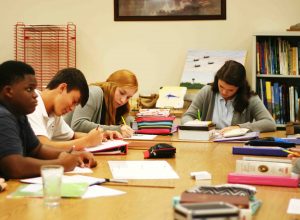What is Integration of Subjects?
Glossary
of Terms
Integration of Subjects:
To integrate subjects means to remove barriers between areas of study and to make connections among subjects, because all truth ultimately belongs to God.
 “Subjects” are a hallmark of modern education–algebra for an hour, then literature, then physics, then Bible (if it’s a Christian school). But when subjects are isolated from each other, students make fewer connections, even between subjects that fit together and inform each other, such as history and literature. They learn not to use all their skills in every class, and never develop the habit of considering everything in life from a Christian perspective.
“Subjects” are a hallmark of modern education–algebra for an hour, then literature, then physics, then Bible (if it’s a Christian school). But when subjects are isolated from each other, students make fewer connections, even between subjects that fit together and inform each other, such as history and literature. They learn not to use all their skills in every class, and never develop the habit of considering everything in life from a Christian perspective.
Classical Christian education strives to integrate material both laterally–every subject with every other subject, and vertically–every subject as it belongs to God.
Integrating Curriculum:
Schools today usually divide subjects into humanities vs. STEM (or social studies vs. science). Humanities includes literature, history, writing, etc.; and STEM includes arithmetic, algebra, physics, etc. These divisions can be dangerous if they teach students to separate knowledge of the natural world (math and science) from God’s truth, as though the two are at odds. This may also lead to considering the humanities merely as science applied to people–or, on the other end of the scale, as merely subjective pursuits with no objective, logical thinking required.
Although ancient and medieval sources do categorize subjects, they do not isolate them in the same way. We see a variety of ways to organize subjects in ancient sources, mostly based on types of knowledge rather than subject matter. Classical education has historically produced people competent in a variety of areas. For example, consider a couple famous “Renaissance men”: Leonardo da Vinci was an artist and inventor, and Benjamin Franklin invented bifocals and the lightning rod in his spare time.
Hugh of St. Victor (11th century) organized subjects like this:
|
Theoretical Arts |
Practical Arts |
|
Mechanical Arts |
Logical Arts |
Teach Deep, Not Wide:
 As we integrate subjects, our goal is to teach multum non multas, which means much, not many in Latin. This simply means that our goal is to teach deeply rather than broadly. What counts is not the number of subjects taught, but how well students learn to think through learning them, which will enable them to learn broadly in other areas of life or academics.
As we integrate subjects, our goal is to teach multum non multas, which means much, not many in Latin. This simply means that our goal is to teach deeply rather than broadly. What counts is not the number of subjects taught, but how well students learn to think through learning them, which will enable them to learn broadly in other areas of life or academics.
Modern education gives students a small, shallow taste of a plethora of subjects, with the hope that they choose the one they like best to specialize in. On the other hand, classical education uses subjects to teach thinking skills, or the tools of learning: skills of language, communication, logic, investigation, puzzle-solving, and common sense and wisdom based on God’s truth. Students have the tools of learning and thinking skills they need to in order to specialize later on. This actually leaves their path open, rather than restricting them.
Classical schools choose to implement these ideas in a number of ways: Many schools integrate the humanities into a single class, by reading classic literature while studying the history of that time, and considering theological and philosophical questions around the topic. Teachers in upper school are generally encouraged to communicate with each other so they know what their students are learning in other classes, and to encourage questions that integrate content from other classes.
All Truth is God’s Truth:
The most crucial reason we integrate subjects is because every subject should be oriented towards God as Creator and Lord. Every subject should be learned with a Christian worldview, helping students see Christ everywhere in everything: He reigns in history; His glorious order and harmony is shown in math; His powerful creativity is evident in science; and the truths of human nature and redemption can be learned in great literature.
The humanities are especially important to integrate around biblical Christian ideas and worldview. History, literature, writing, language, philosophy, theology, and the Bible all tie together and cannot be learned in a vacuum. When students read an old book, place it in historical context, and discuss and write about it, they learn to examine the great ideas with a Christian worldview. Should Beowulf have fought the dragon, knowing he would leave his people without a leader? What effect did Plato’s philosophy have on St. Augustine’s theology? What makes for a just war? Did Thomas Aquinas think of civil authority differently than we do?
But the importance of integration does not stop with worldview: it extends into the idea of paideia. Paideia is the culture and mindset that is naturally taught and absorbed, apart from what a student must recall for a test. When we acknowledge the reality of paideia, we acknowledge that people learn as much from the culture of their school as from the curriculum. Integrating subjects trains students to see their whole life through their identity as a Christian, and it trains them to think carefully whenever they encounter a new idea–not just when preparing for a test.
